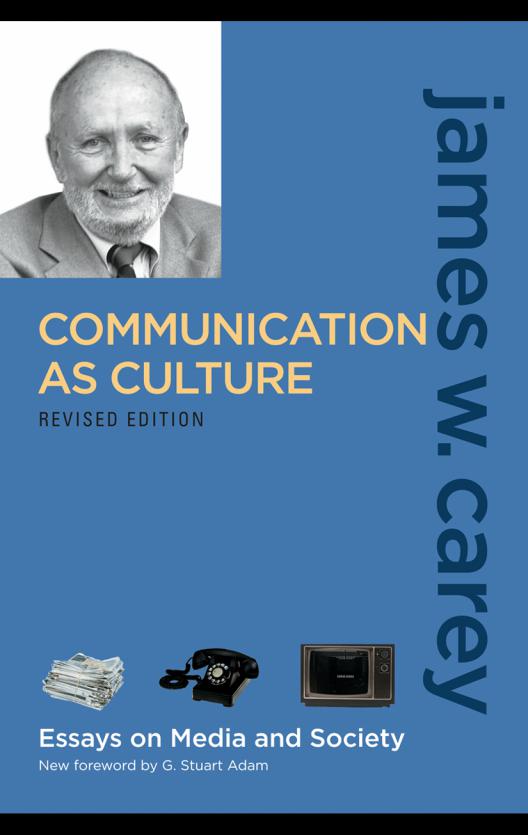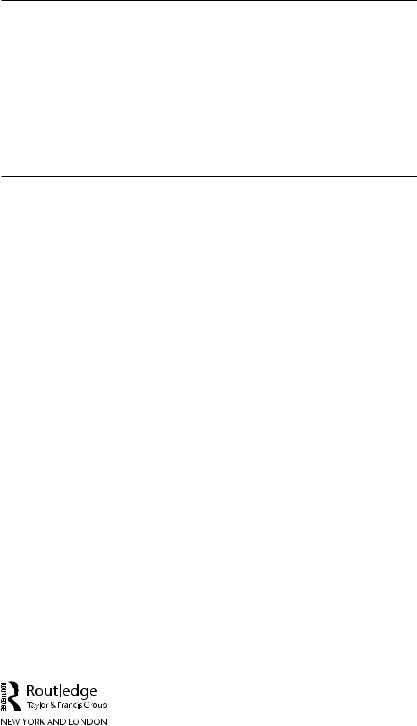


Communication as Culture
In this classic text, James W. Carey maintains that communication is not merely the transmission of information. Reminding the reader of the link between the words “communication” and “community,” he broadens his definition to include the drawing-together of a people that is culture. In this context, Carey questions the American tradition of focusing only on mass communication’s function as a means of social and political control, and makes a case for examining the content of a communication—the meaning of symbols, not only the motives that originate them or the purposes they serve. He seeks to recast the goal of communications studies, replacing the search for deterministic laws of behavior with a simpler, yet far more challenging mission: “to enlarge the human conversation by comprehending what others are saying.”
This new edition includes a new critical foreword by G. Stuart Adam that explains Carey’s fundamental role in transforming the study of mass communication to include a cultural perspective and connects his classic essays with contemporary media issues and trends. This edition also adds a new, complete bibliography of all of Carey’s writings.
James W. Carey was born in 1934 in Providence, Rhode Island. He earned a first degree in Business at the University of Rhode Island before attending the University of Illinois at Urbana-Champaign where he was awarded a doctorate in communications. He was appointed to the faculty at Illinois in 1963 and was director of its Institute for Communication Research from 1969–76. From 1976–79, Carey held the George H. Gallup Chair at the University of Iowa, but he returned to Illinois in 1979 to become Dean of the College of Communication, a position he held until 1992. He joined the faculty of Columbia University’s Graduate School of Journalism in 1992 and remained there until his death in May, 2006. In the course of a distinguished career as an administrator, teacher, original thinker and pioneer in the fields of Communication and American Cultural Studies, Carey published approximately 170 essays, speeches, and reviews.

Communication as Culture
Essays on Media and Society
Revised Edition
James W. Carey
New Foreword by G. Stuart Adam
First edition published 1989 by Unwin Hyman Inc.
First published by Routledge 1992
This edition first published 2009 by Routledge
270 Madison Ave, New York, NY 10016
Simultaneously published in the UK by Routledge
2 Park Square, Milton Park, Abingdon, Oxon OX14 4RN
Routledge is an imprint of the Taylor & Francis Group, an informa business
This edition published in the Taylor & Francis e-Library, 2008.
“To purchase your own copy of this or any of Taylor & Francis or Routledge’s collection of thousands of eBooks please go to www.eBookstore.tandf.co.uk.”
©1989 Unwin Hyman, Inc.
©2009 Taylor and Francis
©2009 Foreword G. Stuart Adam
©2009 Bibliography Daniel Carey
All rights reserved. No part of this book may be reprinted or reproduced or utilized in any form or by any electronic, mechanical, or other means, now known or hereafter invented, including photocopying and recording, or in any information storage or retrieval system, without permission in writing from the publishers.
Trademark Notice: Product or corporate names may be trademarks or registered trademarks, and are used only for identification and explanation without intent to infringe.
Library of Congress Cataloging-in-Publication Data
Carey, James W.
Communication as culture : essays on media and society / James W. Carey ; foreword by G. Stuart Adam.
p. cm.
Includes bibliographical references and index.
1. Mass media and culture. 2. Communication–Technological
innovations. |
I. Title. |
P94.6.C372 2008 |
|
302.23–dc22 |
2008009267 |
ISBN 0-203-92891-1 Master e-book ISBN
ISBN 10: 0–415–98975–2 (hbk)
ISBN 10: 0–415–98976–0 (pbk)
ISBN 10: 0–203–92891–1 (ebk)
ISBN 13: 978–0–415–98975–6 (hbk)
ISBN 13: 978–0–415–98976–3 (pbk)
ISBN 13: 978–0–203–92891–2 (ebk)

Contents
|
Series Editor’s Introduction |
vii |
|
Foreword |
ix |
|
Acknowledgments |
xxv |
|
Introduction |
1 |
PART I |
|
|
Communication as Culture |
9 |
|
1 |
A Cultural Approach to Communication |
11 |
2 |
Mass Communication and Cultural Studies |
29 |
3 |
Reconceiving “Mass” and “Media” |
53 |
4 |
Overcoming Resistance to Cultural Studies |
68 |
PART II |
|
|
Technology and Culture |
85 |
|
5 |
The Mythos of the Electronic Revolution |
87 |
|
with JOHN J. QUIRK |
|
6 Space, Time, and Communications: A |
|
Tribute to Harold Innis |
109 |

vi Contents
7 |
The History of the Future |
133 |
|
with JOHN J. QUIRK |
|
8 |
Technology and Ideology: The Case of the |
|
|
Telegraph |
155 |
|
References |
178 |
|
A Bibliography of James W. Carey |
185 |
|
Index |
199 |

Series Editor’s Introduction
In their unrevised form as articles and lectures, the essays gathered in this book helped to establish the ground for cultural approaches to the study of communications and modern technology. On reading in The American Scholar the first version of “The Mythos of the Electronic Revolution” (chapter 5), Marshall McLuhan wrote Carey a letter hailing him as a “fearless character,” who was taking “his academic life in his hands.”
McLuhan had a keen awareness of the embedded institutional power of the “mass communications” establishment in the decades following World War II and an equally strong sense of its intellectual inadequacy, its narrow empirical and behaviorist notions of people and cultural institutions. He recognized how bold and in its own way how radical is Carey’s ambi- tion—it was McLuhan’s as well, of course—to put in question our inherited mythologies of “communication” and “mass media” and the “electronic revolution.”
Yet in the theoretically self-conscious and ideologically attuned discourse that dominates cultural interpretation of all sorts as we begin this last decade of the twentieth century, Carey’s fearlessness might be said to reside in nearly opposite virtues. His voice is distinctive and important in our current scholarly climate, that is, in part for its very refusal to yield entirely to a vocabulary of power, for its resistance to the privileging of “ideological” as against “mythic” or “ritual” or “anthropological” elements in the description and interpretation of cultural formations.
Mediating and ambivalent, the essays collected here insist on the ideological/ political dimensions of media theory and practice, but they do so in a moderating, pluralist, and citizenly spirit. Culture is not a one-way process, so runs Carey’s continuing subtext. A domination model of social experience must oversimplify cultural transactions, which always contain elements of collaboration, of dialogue, of ritualized sharing or interaction. A “progress” model is similarly reductive, masking a rationale for established power and established

viii Series Editor’s Introduction
ways of thinking and also underestimating the individual and communal, the interactive dimensions of culture.
This book itself embodies the virtues of dialogue and intellectual collaboration, of course. The pluralist American philosophers John Dewey and William James are shaping spirits here; and I imagine that Carey’s nonspecialist use of these thinkers and his generous, lucid accounts of such contemporaries as Clifford Geertz, Raymond Williams, and Harold Innis will be helpful for many readers. Still more, I hope that Carey’s flexible spirit, his hostility to terminologies, his pluralist and democratic notions of culture will reach a wide new audience of teachers and scholars and reader-citizens.
—David Thorburn
